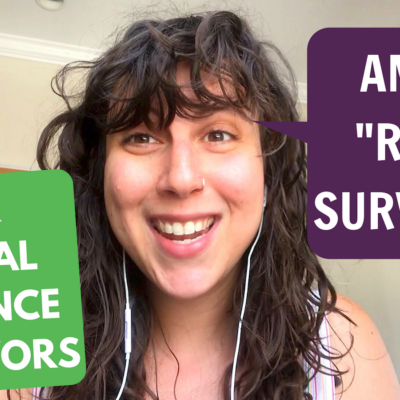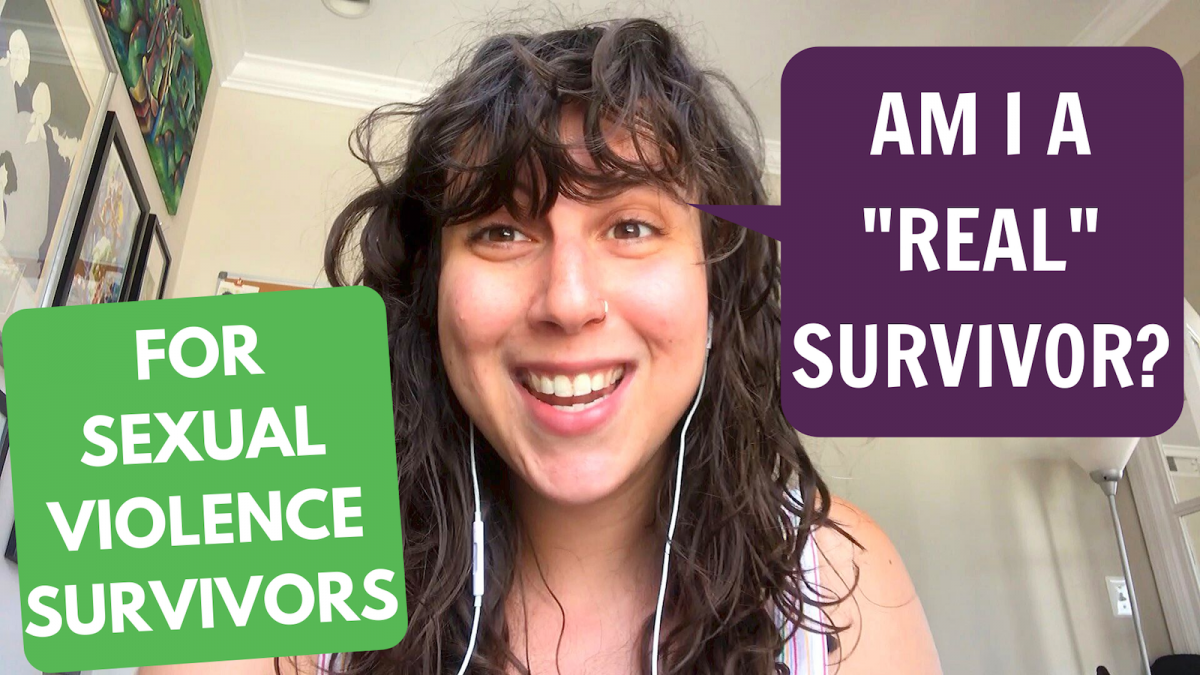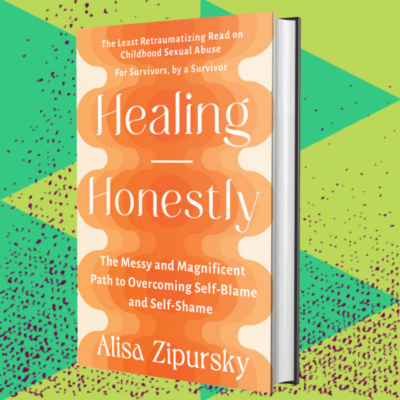This story mentions sexual violence but doesn’t describe it, just talks about the emotional impacts such as self-doubt and invalidation.
Healing Honestly is on Youtube!
Each week I will be bringing you a new youtube video (always less than 9 minutes in length!) where I answer your most commonly asked questions. Check out the video below and please subscribe and like you so you can see my future videos! If there’s a question you’d like me to answer please comment underneathe the video!
Transcript of video “How to talk back to the inner voices that say we aren’t ‘real’ survivors”:
Hi, everyone! Alisa Zipursky here from HealingHonestly.com. I will be bringing videos to you every week talking about what it means to be healing from sexual violence and being a young person living with trauma. This week, we’re going to be talking about those voices inside of our head that tell us that we’re not a real survivor, or that maybe we’re crazy and making our own trauma up.
We’ll talk about why those voices are there and also some strategies for how to talk back to them.
Voices of self-doubt as a sexual trauma survivor are totally normal
The first thing that’s really important is to talk about how normal it is to experience those voices in our head that are doubting ourselves in our own truth. We know deep down in our gut that something really wrong happened to us. But still, we keep hearing in our head, “Oh, maybe we’re making it up. Maybe we’re exaggerating, maybe we’re being drama queens.”
That is an incredibly normal response to sexual trauma. I hear from thousands of people on my website all the time, who are googling, “what if I made this up?,” “How do I know I can believe in myself and believe my own truth?” And that’s so common. First, know that if that’s happening to you, you’re in extremely good company, and it doesn’t mean there’s anything wrong with you. That’s how so many of our brains respond to sexual trauma.
Why do those voices of self-doubt exist?
Rape culture
There are reasons why we can feel that way and it has to do with the fact that we live in a society where we are constantly getting messages, both implicitly and explicitly, that, somehow, we’re not “real” survivors which leads us to feel completely invalidated. It’s just really rape culture in action. It’s definitely made even worse by systems of oppression, such as racism, that just even further silence survivors in feeling like they’re not the real survivors or they’re not credible because we are seeing in the news all the time survivors coming forward and being told, no, there is a real survivor out there, it’s just you and your story aren’t it.
Traumatic Memory
We can also feel this way because of the way traumatic memory works for a lot of us. For a lot of us, we don’t have clear memories of our sexual violence, we don’t have memories that tell us the beginning, middle, and end of what happened to us.
We have these body memories, these flashbacks, these feelings deep down in our gut where our bodies are re-enacting our trauma all the time even if our brains don’t remember clearly what happened. And that can just further silence us and make us hear these loud voices of questioning, because we think, “Oh, well, if it was real, I should be able to remember this clearly, because I live in a world where everyone expects me to have a really clear memory of what happened.” But we know scientifically, traumatic memory is really complicated and works completely differently than healthy memories.
Sometimes the people closest to us are doubting us
Another reason why this happens is because sometimes the people closest to us are questioning us, and we internalize their voices in our own heads. Maybe you’ve had an experience where you’ve told a close friend or a family member, and they’re the ones saying, “I don’t know if I believe you, and how do you know this is real? How do you know you’re not making it up?” We internalize those voices.
We’re getting it both from a larger rape culture that we live within everywhere we go but also from often times people who are really close to us too. There’s lots of really good reasons why those voices exists within us, and none of them are because there’s something wrong with you, or that you’re not a real survivor.
These voices happen to so many of us. And again, it doesn’t mean there’s anything wrong with you and it doesn’t mean your truth isn’t your truth and what happened to you didn’t happen to you.
Strategies for talking back to the inner voices telling us we aren’t “real” survivors:
Identifying someone we can trust and asking them help us combat the voices
The first strategy I offer to talk back to those voices inside of our heads that can be so loud, and as a result end up really silencing us, is to find somebody that we can trust to confide in and ask for their help.
Whether it’s a therapist, or a family member, or a friend, or a teacher, somebody we know who we feel deep in our gut that is a safe person for us, and ask them for help. Let’s tell them, “Listen, what I need to hear from you is that I’m not crazy and I’m not making this up, and that this is a normal response to trauma.”
Sometimes hearing myself say it isn’t enough. I need somebody outside of me to say that. I have found that people are so excited to be able to help us and for us to be able to offer them like a concrete way to support us. People like being told how to support another person.
Learn more about how traumatic memory and body memories work
The second is to read more about our bodies and our bodies on trauma and how traumatic memory can work to help us normalize and destigmatize these feelings of like, oh, well, because I don’t have this specific kind of memory I’m not a real survivor or maybe I’m making it all up.
I mean, for that I definitely recommend reading Bessel van der Kolk’s The Body Keeps the Score and also going on to HealingHonestly.com, where you can read about my own stories about living with traumatic memory and not having clear narrative memories of my abuse and my journey to accepting my own truth.
Rape culture is everywhere and it isn’t our fault we hear voices of self-doubt
Remember that we live in a world where rape culture is bountiful, and it’s not our fault that we are hearing these voices all the time.
This is a completely normal response to living in a world where there is no survivor good enough to actually be credible in our society. Especially if you are a survivor who is part of a marginalized group, whether you’re black, whether you’re indigenous, you’re Latinx, you’re queer, you’re trans, your story doesn’t go along with like, “Oh, I’m this woman and the person who harmed me was this man” the way my story does in these like heteronormative ways we think about violence. All of those things add further levels of the oppressive nature of how we can feel silenced in our truth.
Remember, you are never alone
Most of all, remember that no matter what you’re not alone in feeling like this, that even when you are feeling moments of self-doubt, know that I believe you and I know your pain is real, and your pain matters.
And even if you’re feeling unsure of yourself, know that I am standing beside you, and I’m always sure of you. Your truth matters and I stand beside it. So to hear more, please subscribe and like, and please share with me any strategies that you have for talking back to those voices in the comments below.
Pplease go to www,healinghonestly.com and you can sign up for my Friday newsletters, which are always filled with fun GIFs and puppy videos. And I’ll see you all next week.


